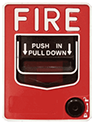Video MGMT System
 Access Control
Access Control
Voice & Data Wiring
 Burglar Alarm
Burglar Alarm
 Fire Alarm
Fire Alarm
Video MGMT System
Voice & Data Wiring
THOUGHT CENTER > Blog > Alarms
January 5, 2024
Too busy to read? Here’s a summary:
In today's world, where more than six million property crimes occur every year (FBI), the question of if and where tenants can install security cameras is more relevant than ever.
Our team at Mammoth Security understands the nuances and complexities of this topic, and we wrote today’s blog post to shed light on it.
So, if you’re a tenant concerned about your ability to install security cameras or a landlord wondering about your rights, today is your lucky day.
You’re at the right place to find the information you’re looking for.
Generally, tenants have the right to feel safe and secure in their leased premises.
However, this doesn't automatically mean they can install security cameras willy-nilly. After all, the property doesn’t belong to the tenant. It belongs to the landlord.
The landlord, therefore, has a right to place restrictions on installations, especially if those installations will physically change the property in any way.
When you want to understand your right to install cameras, your lease agreement is the first place to look. Some leases have clauses about modifications or additions to rental properties, which can include security systems.
If it’s not clear as day, it’s best to have a chat with your landlord. Getting a thumbs-up from them in writing before installation is a surefire way to avoid future disputes—regardless of what a previously signed lease agreement may state.
Bear in mind that some security camera installations are more invasive than others.
While your landlord may take issue with tearing out a wall to add in cabling infrastructure, cameras that respect the privacy of others and don’t physically change the property are likely to be approved.
Keep the lines of communication open. If you’re thinking about adding more cameras or changing something, give your landlord a heads-up. It’s just good manners.
And let’s not forget the element of human relations. Keeping a good rapport with your landlord is priceless.
When you’re thinking about setting up security cameras, you’ve got to tread carefully around legal and privacy issues.
Laws vary depending on where you are. Some states and localities have specific rules about surveillance. Do your homework or consult a legal professional when in doubt to make sure you’re not stepping on any landmines.
Privacy laws are a big deal. You can’t just place cameras wherever you’d like.
For example, installing cameras to spy on people in restrooms or spaces where people have “a reasonable expectation of privacy” is a big no-no.
In Connecticut, for example, using security cameras to secretly spy on people in areas where they may undress—such as bathrooms and bedrooms—is likely to run afoul of serious voyeurism laws.
This article is provided for informational purposes only and is not intended to be a substitute for professional legal advice. We recommend consulting with a qualified legal professional to obtain advice specific to your situation and local laws before making any potentially problematic decisions related to the installation of security cameras or other security equipment.
Installing security cameras as a tenant is doable, but it’s all about doing it sensibly.
At Mammoth Security, we're committed to providing top-notch advice and solutions for all your security system needs. Don't hesitate to reach out by clicking to contact us and filling out the form for a free site survey and security assessment.
We leverage our knowledge and experience to help people navigate the complex world of security systems with ease.
NOT COMPLETELY SURE?
860-748-4292In rental properties, tenants can legally install security cameras, but it's subject to the terms of their lease agreement and local privacy laws. Get the landlord's written permission and ensure the installation doesn't invade others' privacy or alter the property significantly.
Key considerations before tenants install security cameras include checking the lease agreement for any clauses about modifications, obtaining the landlord's written consent, ensuring the cameras don't invade the privacy of others, and respecting state and local surveillance regulations.
To respect privacy laws, tenants should avoid placing cameras in areas where there's a reasonable expectation of privacy, like restrooms or other tenants' private spaces, and should be aware of specific state laws for rentals with security cameras, like Connecticut's regulations against voyeurism.
Before installing security cameras, tenants should review their lease agreement, discuss their plans with the landlord and obtain written consent, choose non-invasive camera types, and familiarize themselves with local privacy and surveillance laws.
Maintaining open communication with the landlord and seeking their approval before making changes is key to preserving a good tenant-landlord relationship.
Tenants should not install security cameras in areas where individuals have a reasonable expectation of privacy, such as restrooms, bedrooms, or other tenants' private spaces.
Improper installation of security cameras can lead to legal consequences, including violations of privacy laws, potential lawsuits, and conflicts with state and local surveillance regulations.
The lease agreement may contain clauses that restrict modifications or additions to the property, including security camera installations, making it crucial for tenants to review and adhere to these terms or seek written permission that overrides the lease agreement.
If the lease agreement is unclear about security cameras, tenants should discuss their intentions with the landlord and seek clarification or written permission to avoid misunderstandings.
State and local regulations can significantly affect security camera installation, as there are likely to be specific rules about surveillance and privacy that tenants must comply with.